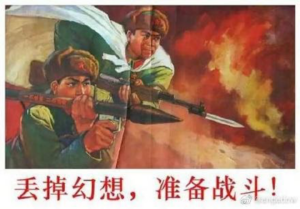
“Cast off your illusions and prepare for war.” POLITICO Screengrab/Weibo.com via Shen Lu
China’s ideological challenge against liberal democracy seems orders of magnitude more effective than anything Soviet propaganda of the Cold War era could hope to achieve. As the U.S. sinks ever-deeper into an economic and political crisis, Beijing has been aligning with revisionist Russia and offering economic inducements to countries in Europe and Asia to consider breaking ranks with Washington, argues Andrew A. Michta, the dean of the College of International and Security Studies at the George C. Marshall European Center for Security Studies.
The nature of this ideological challenge merits special attention. China has the wherewithal to become the first high-tech totalitarian state in history. This would allow it not just to control its citizens, but also information flows within and across other countries, targeting Washington’s allies and the U.S. itself, he writes for POLITICO.
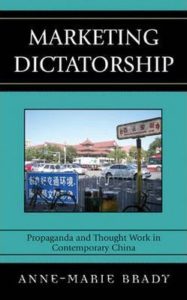 The ideological dimension of this unfolding great power competition will only grow in importance, because the U.S.’s elite class has been seized by self-doubt over the past decade about the core tenets of our democratic republican project, with the progressive degradation of the central tenet of citizenship displaced by race and gender group categories, Michta contends.
The ideological dimension of this unfolding great power competition will only grow in importance, because the U.S.’s elite class has been seized by self-doubt over the past decade about the core tenets of our democratic republican project, with the progressive degradation of the central tenet of citizenship displaced by race and gender group categories, Michta contends.
China is following a belligerent foreign policy which singles out countries such as Australia for punishment, as examples to other governments, adds Anne-Marie Brady, a Professor in Political Science at the University of Canterbury, New Zealand, and author of Marketing Dictatorship. Australia’s “offence”? Simply put: passing laws aimed at protecting the political system against Chinese Communist Party interference, launching freedom of navigation exercises in the international waters of the South China Sea through which the bulk of Australian shipping passes and daring to ask the Xi government to examine the origins of the COVID-19 outbreak that unleashed the devastating global pandemic, she writes:
The pandemic strengthened China’s relative hard power as well as its appetite for confrontation. In early 2020, CCP agencies instructed CCP proxy groups to buy up bulk quantities of personal protective equipment around the world and send them back to China. Then, when other countries were short on supplies, the CCP government threatened to withhold sales of PPE to states such as New Zealand that had early on closed borders to Chinese travellers.
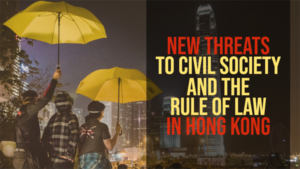
National Endowment for Democracy (NED)
The dream of democracy in Hong Kong, seeded by barrister and democracy advocate Martin Lee and others and kept alive by successive generations, is crashing around them, The Wall Street Journal reports.
“The rest of the world, including me, thought so long as China can keep modernizing herself along the Hong Kong line, then China and Hong Kong would go down the same route,” he said. “Democracy for China, democracy for Hong Kong.”
“Martin had a kind of benign optimism where he didn’t seem to get too upset when things were difficult,” said Jerome Cohen, a New York University law professor and China legal authority who worked in Hong Kong. “He had the languages, the intellect, the humor, and the bearing in court and in public speech. That is why they all feared him so much.”
The dream of democracy in Hong Kong, seeded by Martin Lee and others and kept alive by successive generations, is crashing around them. https://t.co/xjnCvQuqbE via @WSJ
— Democracy Digest (@demdigest) November 16, 2020
The US-China contest is a clash of systems as much as a clash of interests because Beijing is challenging American influence and America’s conception of what values an international order should embody, says analyst Hal Brands.
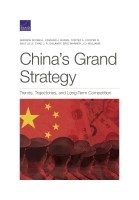 The US-China contest is one for the long haul, even though its intensity will wax and wane over time. The United States cannot cease being a threat to the Chinese Communist Party without ceasing to be what it is—a democracy concerned with the fate of freedom around the world. And China cannot cease being hostile to the US-led international order without ceasing to be what it is—an autocratic regime whose strength masks pervasive insecurity, he writes in Regime realism and Chinese grand strategy, a report for the American Enterprise Institute:
The US-China contest is one for the long haul, even though its intensity will wax and wane over time. The United States cannot cease being a threat to the Chinese Communist Party without ceasing to be what it is—a democracy concerned with the fate of freedom around the world. And China cannot cease being hostile to the US-led international order without ceasing to be what it is—an autocratic regime whose strength masks pervasive insecurity, he writes in Regime realism and Chinese grand strategy, a report for the American Enterprise Institute:
China is not just any state; it is a Leninist party state. …. Such a regime can never feel secure in its own rule because it does not derive its authority from the freely given consent of the governed; it can never feel safe in a liberal world order because liberal norms subvert the authoritarian ethos it uses to govern at home. Such a country will have particularly sharp conflicts with democratic great powers, not just on the basis of divergent interests, but on the basis of divergent views of what makes a government legitimate.
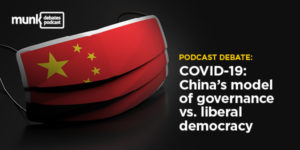 The CCP cannot feel safe in a world in which democratic norms are prevalent, so a world
The CCP cannot feel safe in a world in which democratic norms are prevalent, so a world
where China is more influential will inevitably have a more illiberal, authoritarian cast, adds Brands. RTWT
Australian Jeffrey Wilson, research director of the Perth USAsia Centre expects the U.S. policy focus on China to shift away from trade to other areas including “concerns regarding political rights under the Chinese Communist Party (CCP), such as Xinjiang and Hong Kong, and economic issues, such as commercial espionage and the security of the technology ecosystem”.
China’s new wolf warrior diplomacy is a Maoist resurrection https://t.co/CNRntwEctk
— Democracy Digest (@demdigest) November 16, 2020







